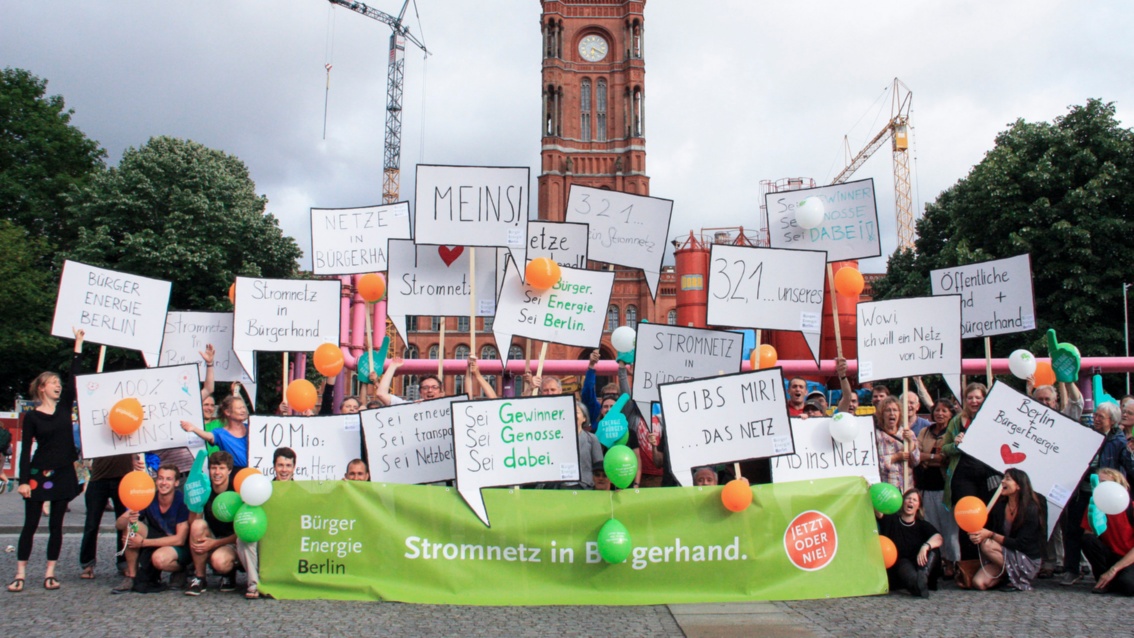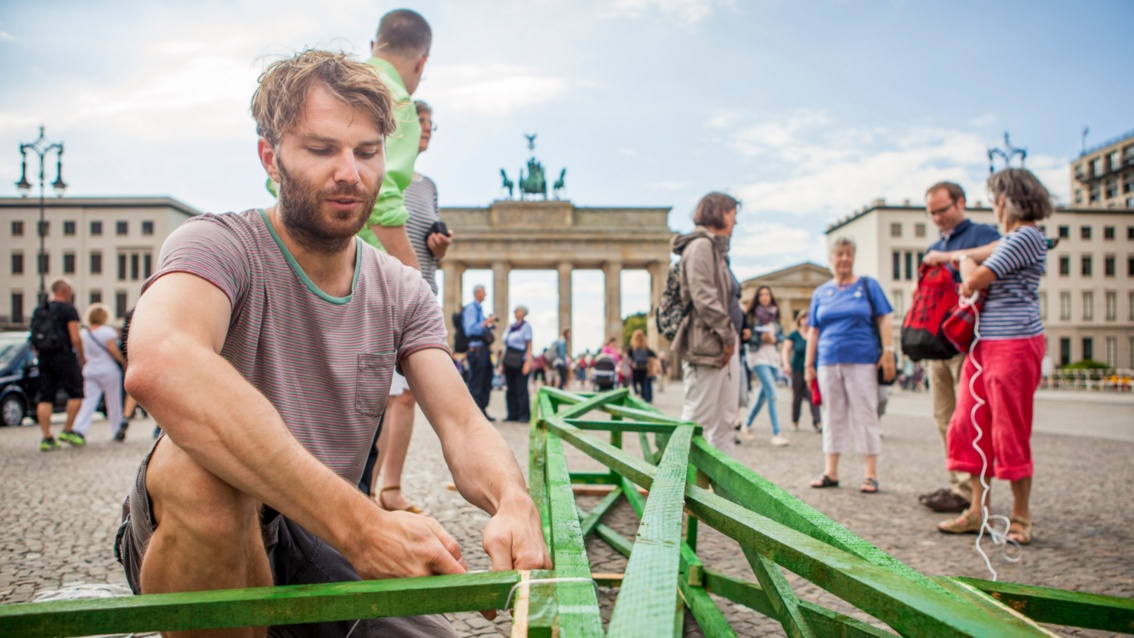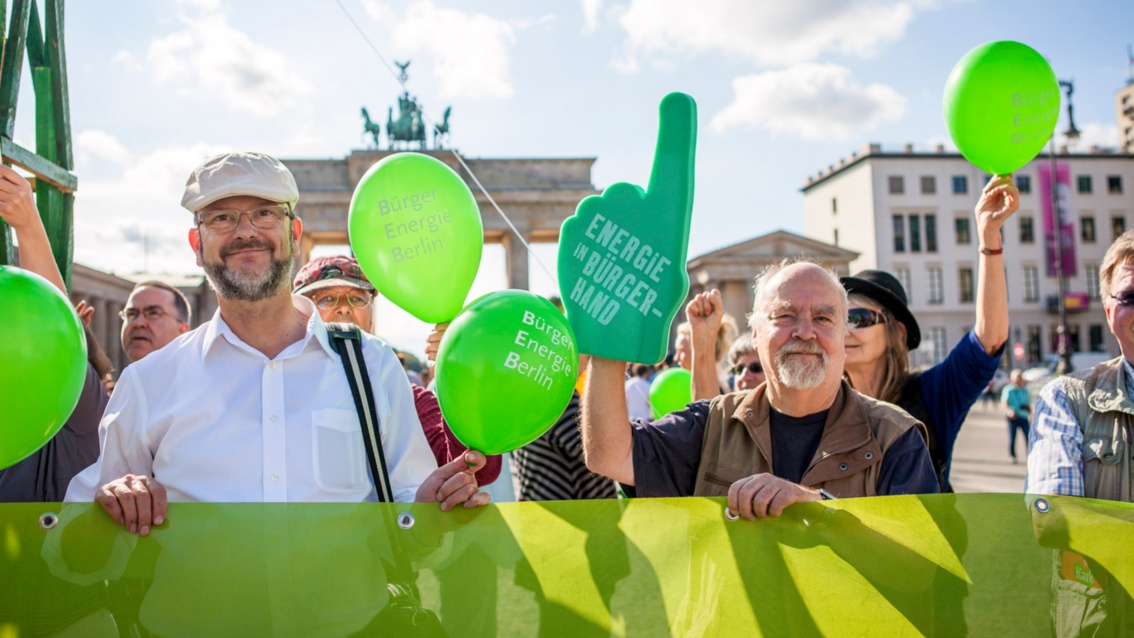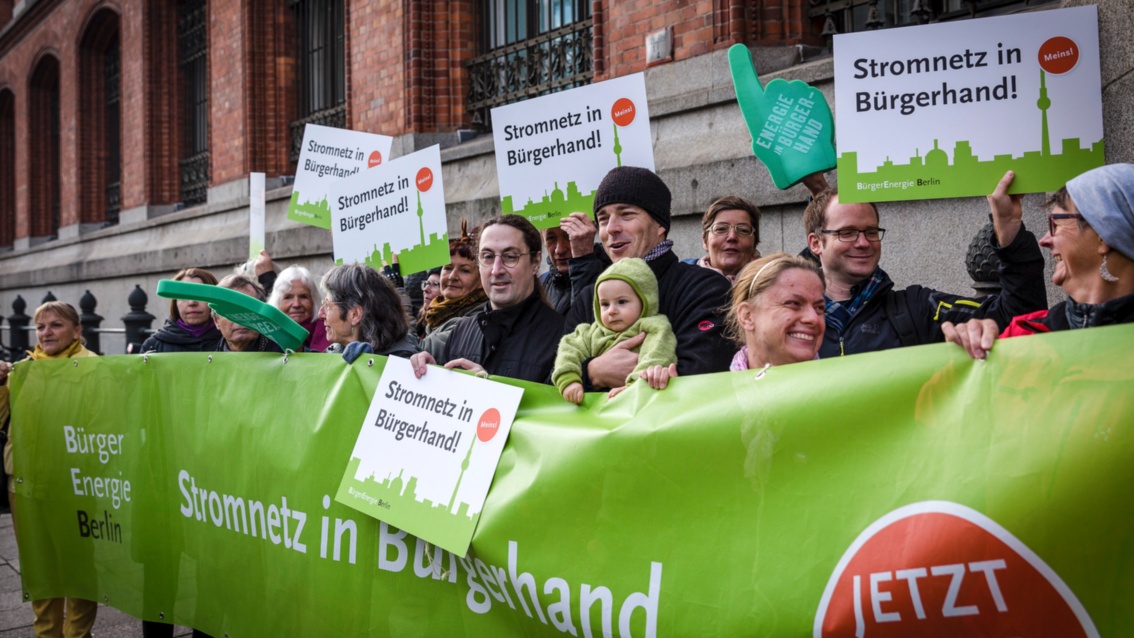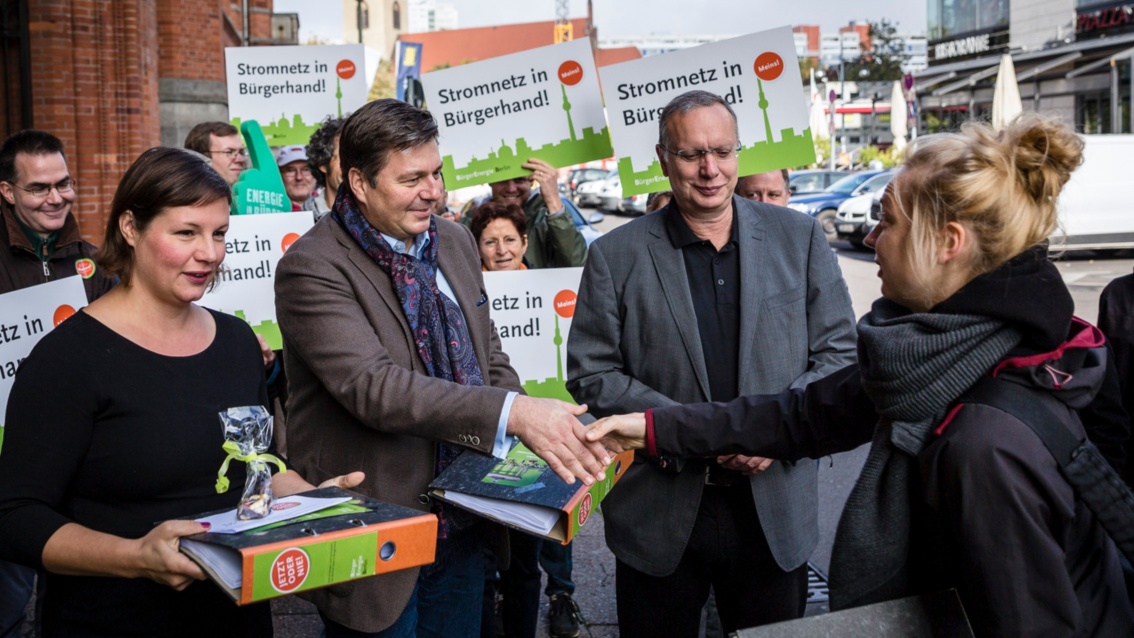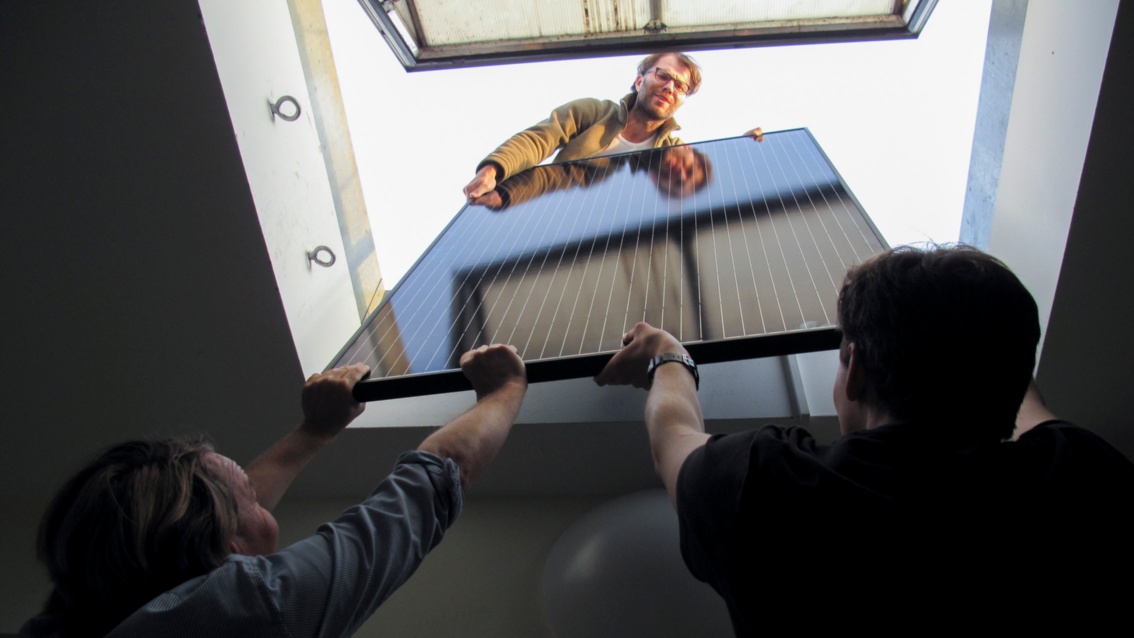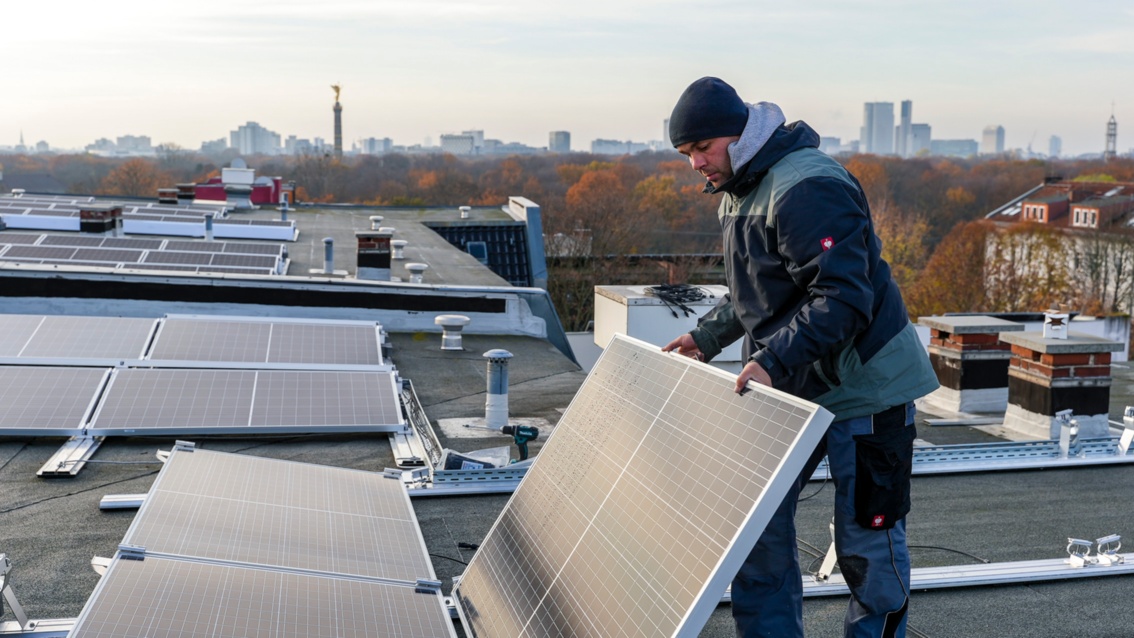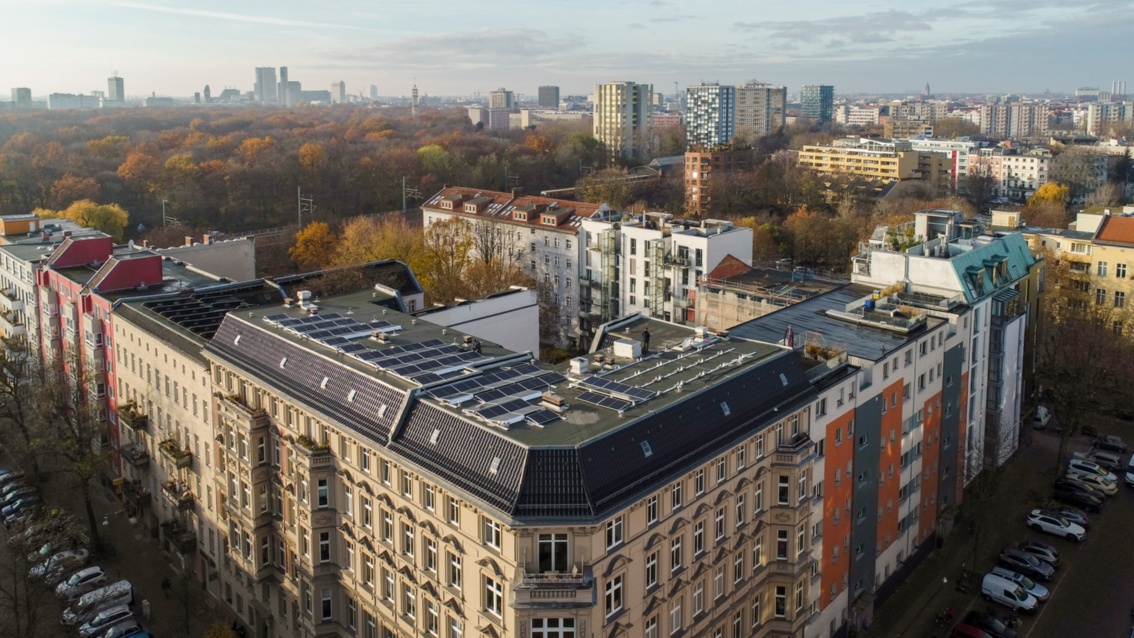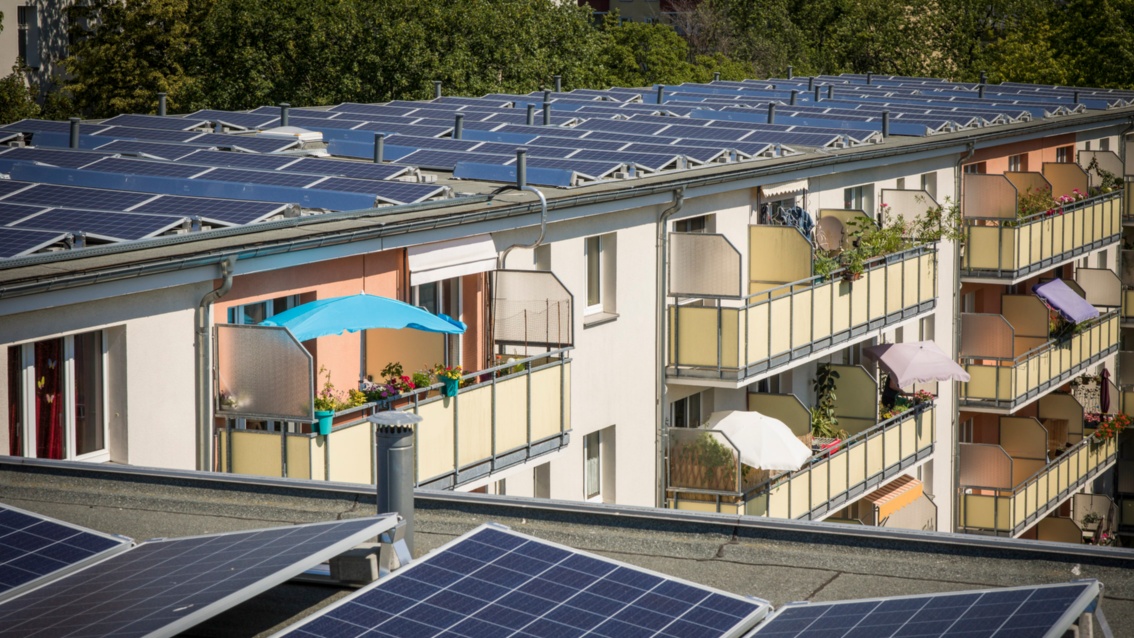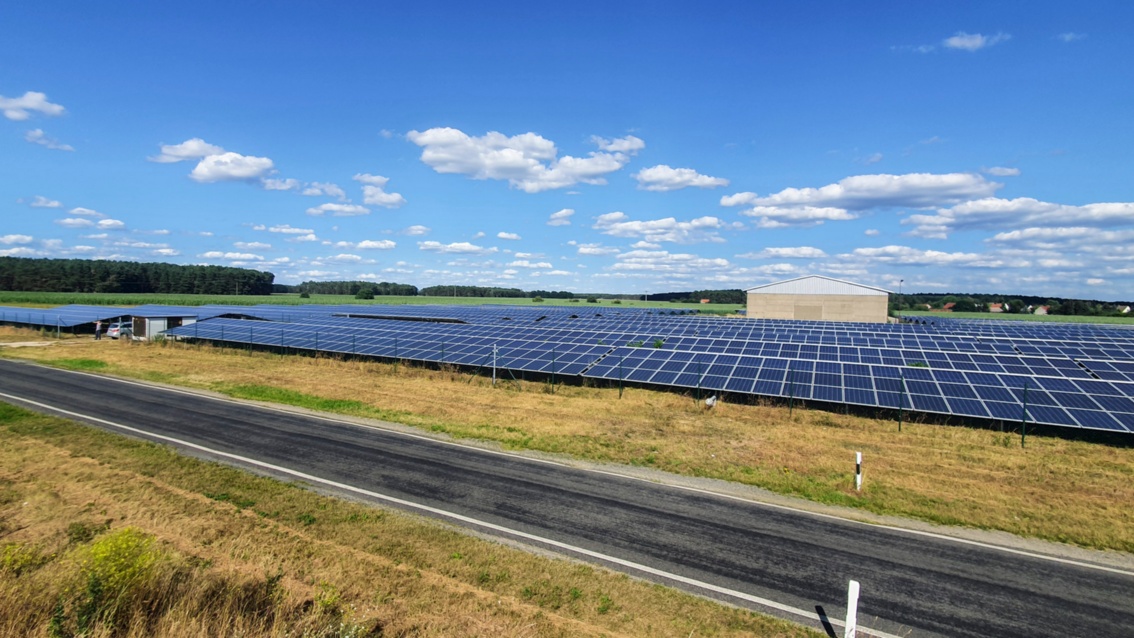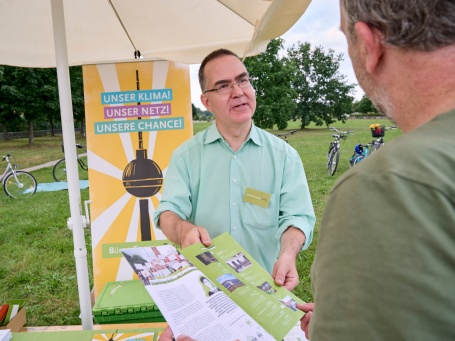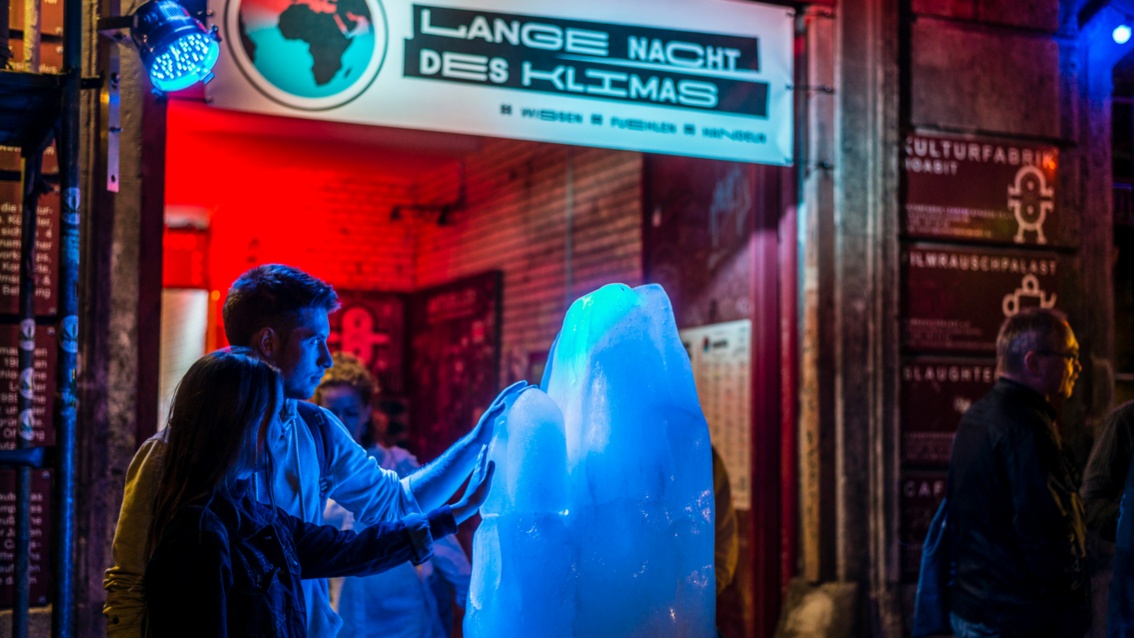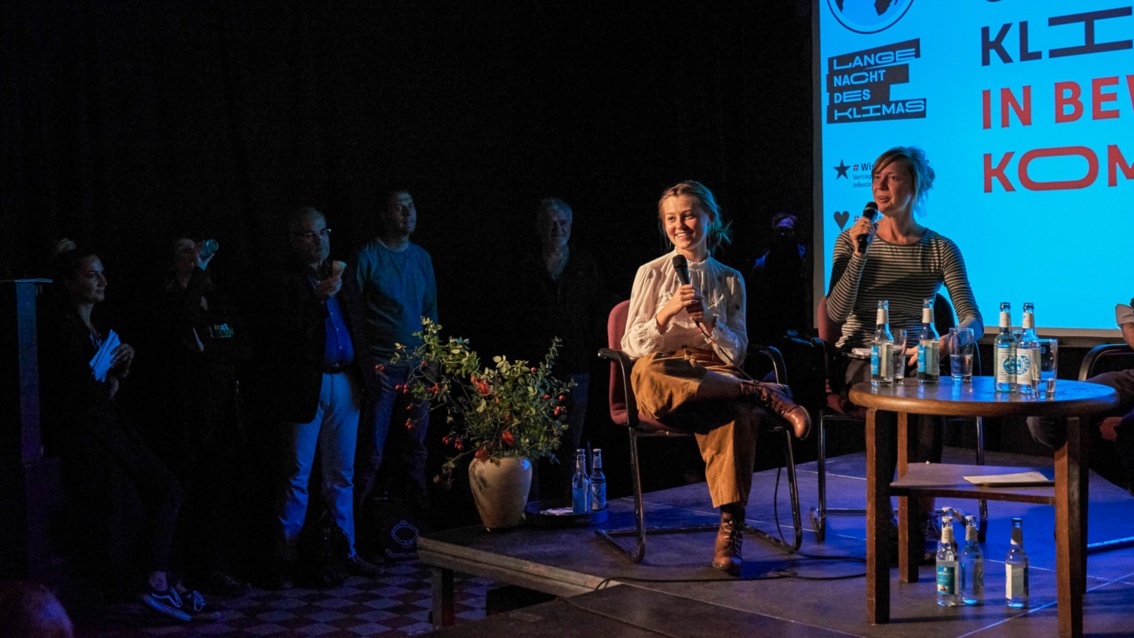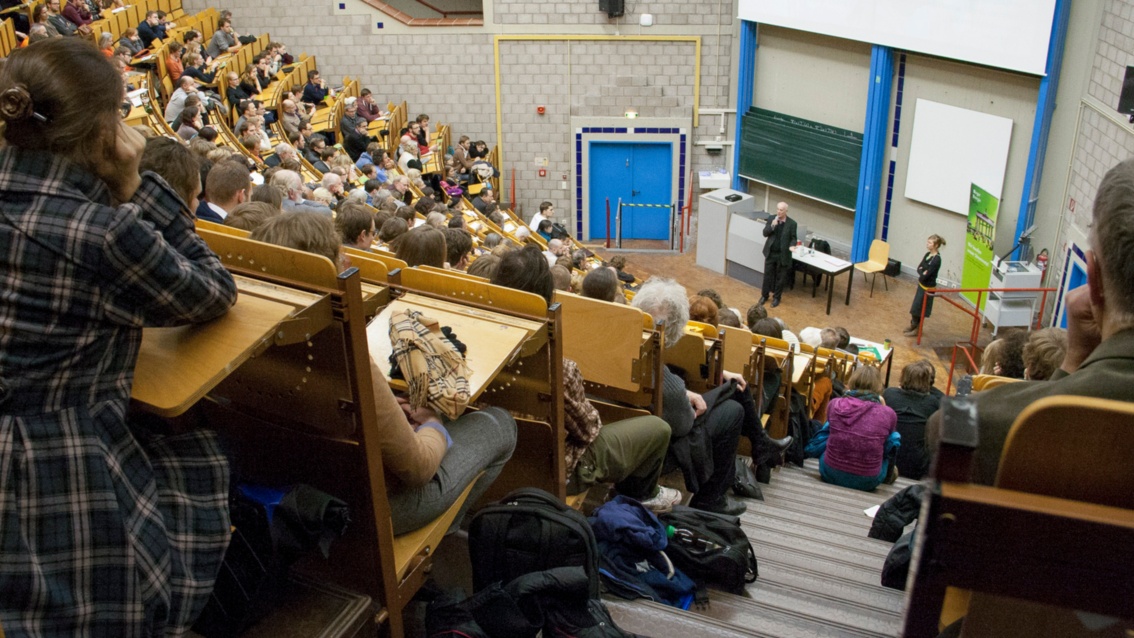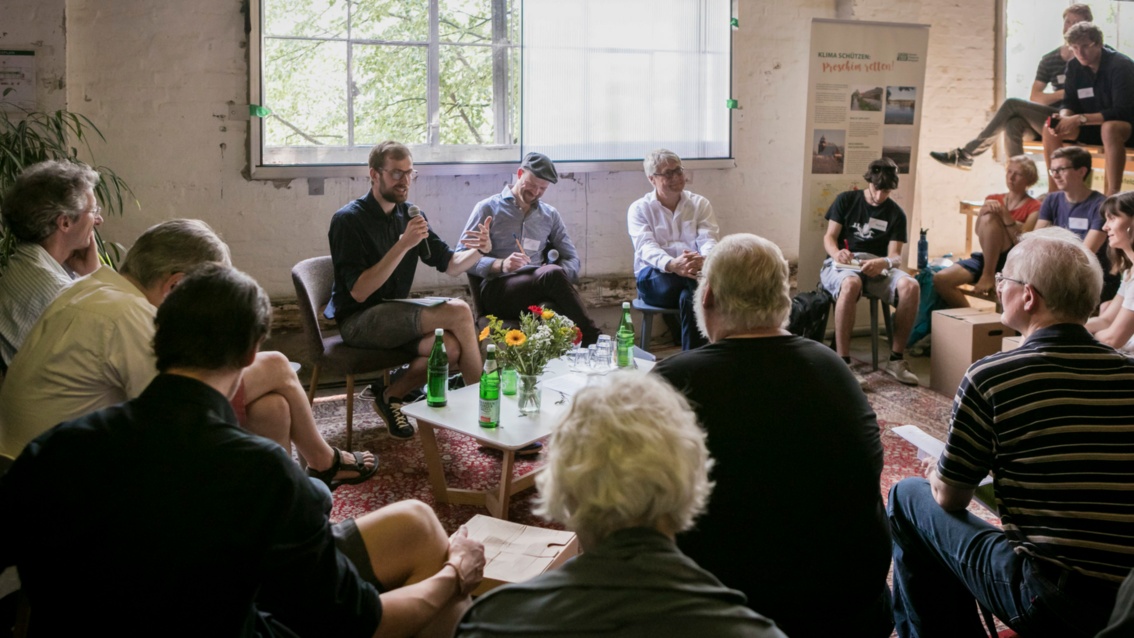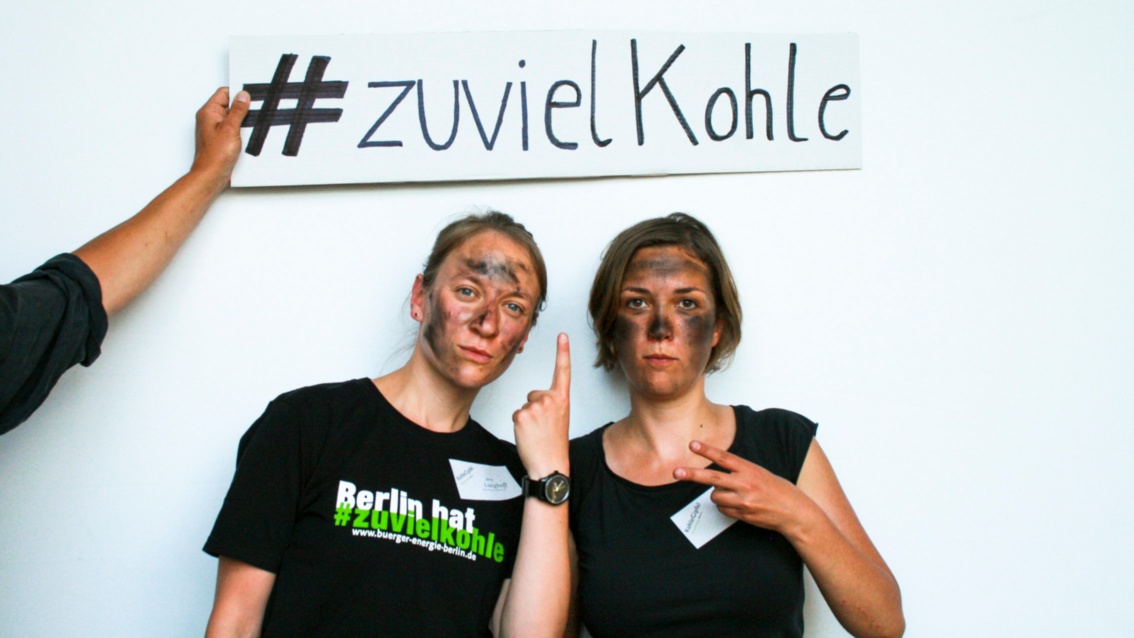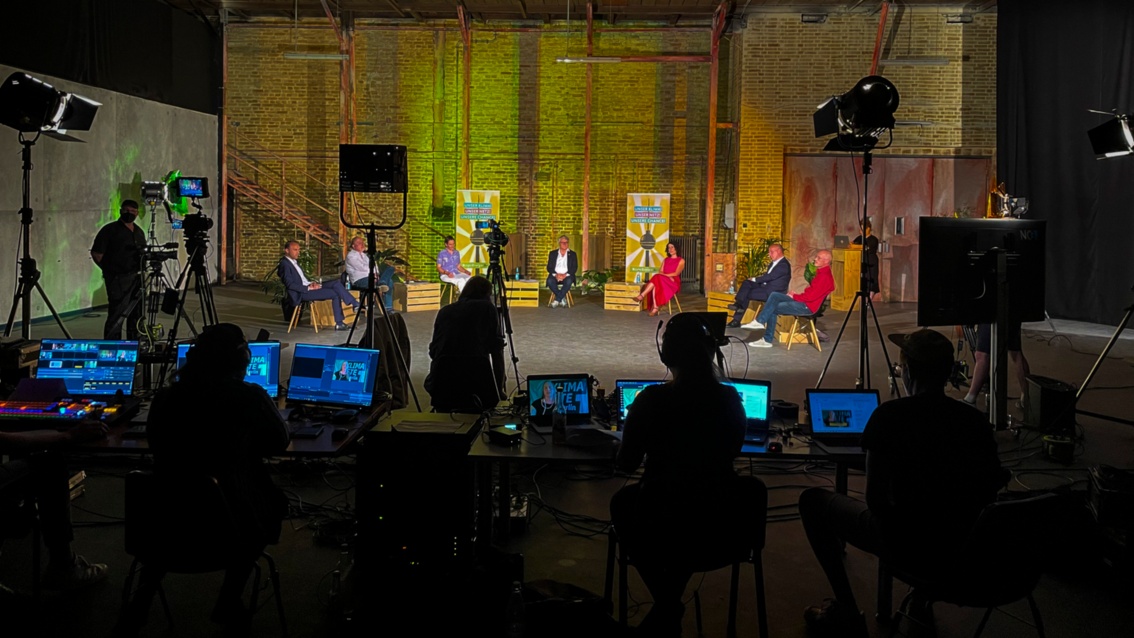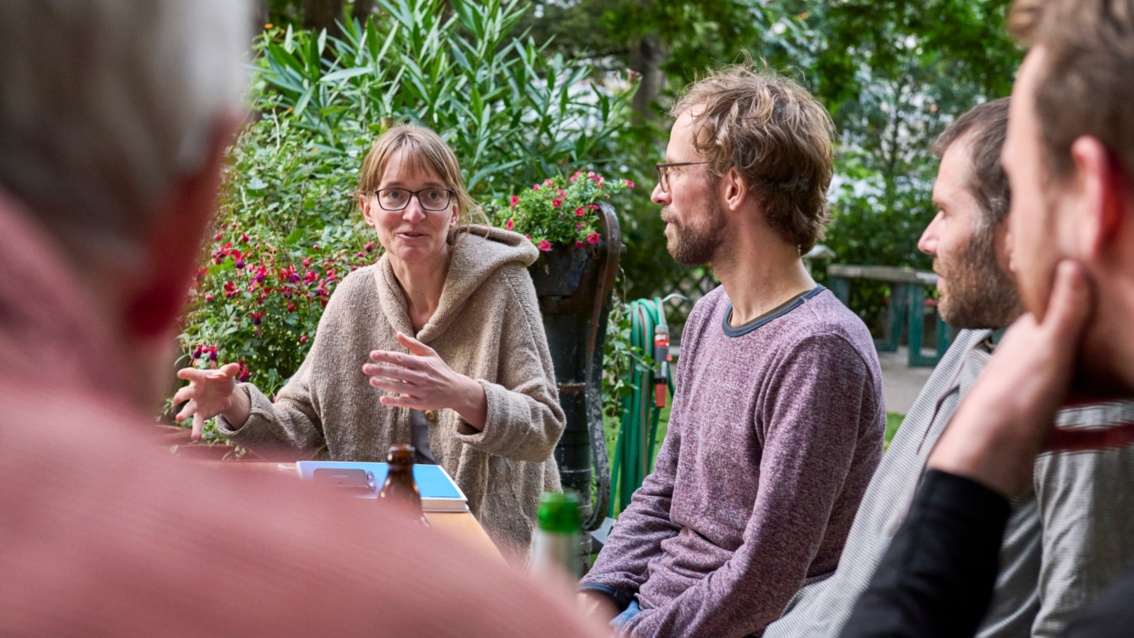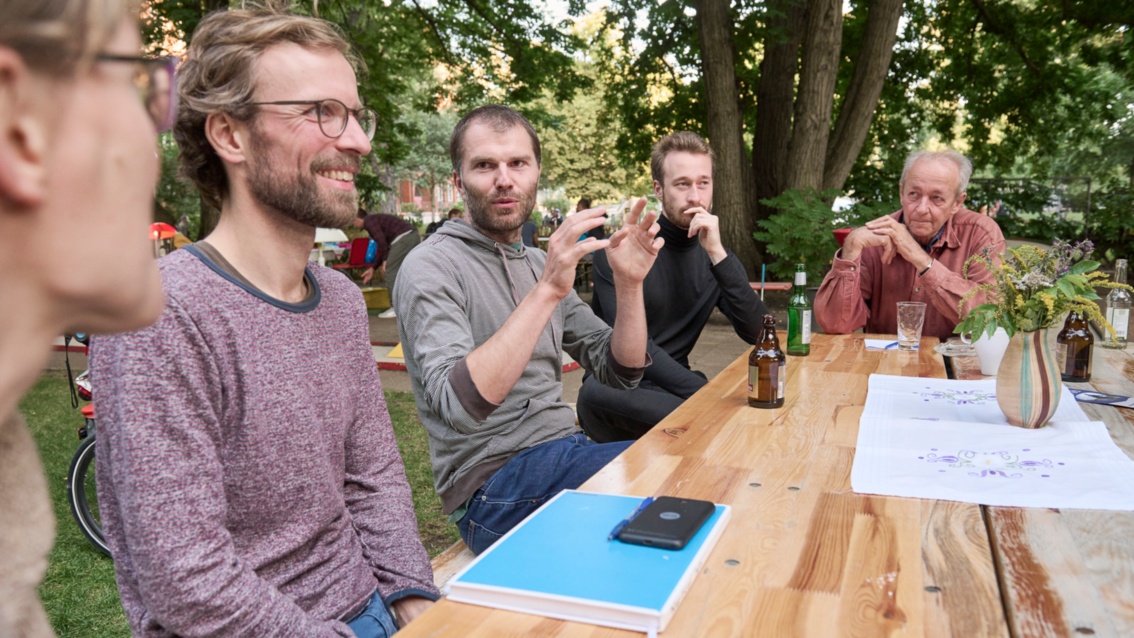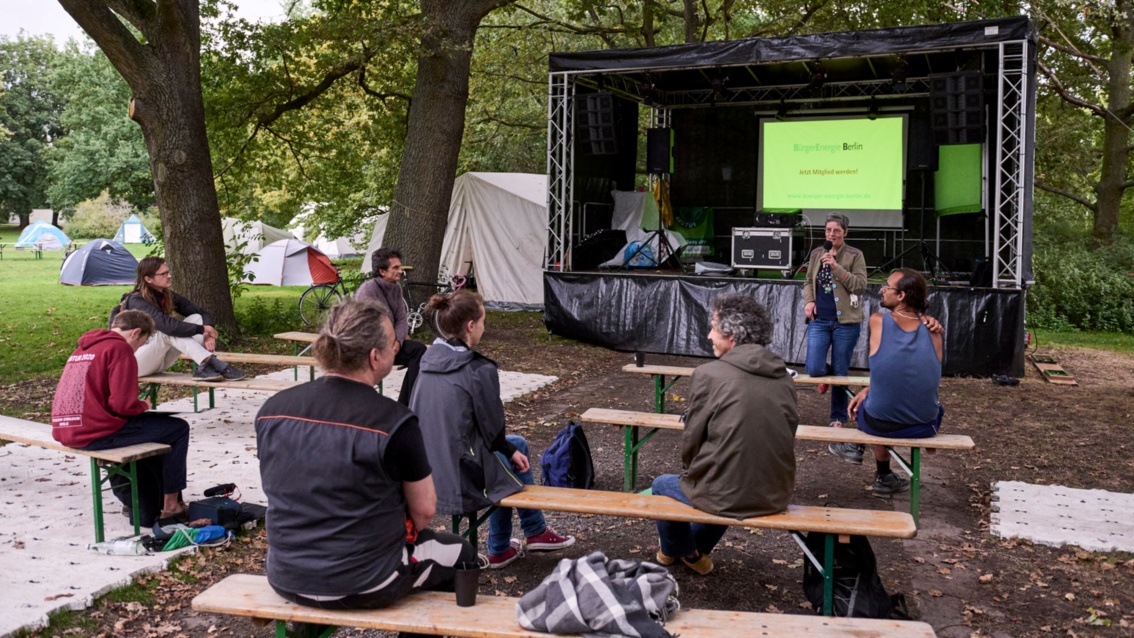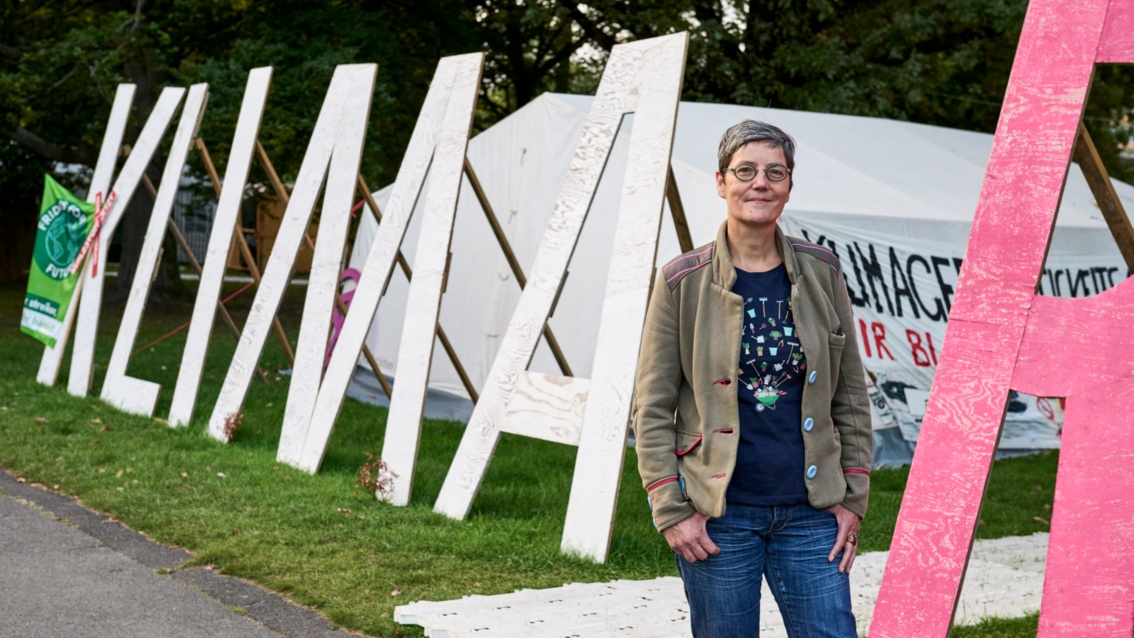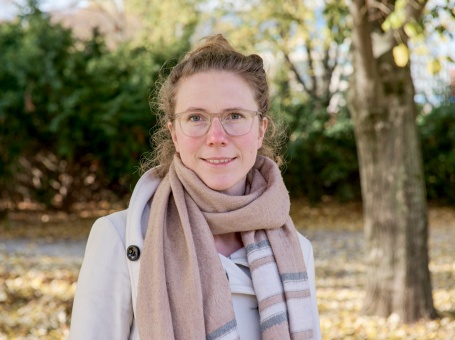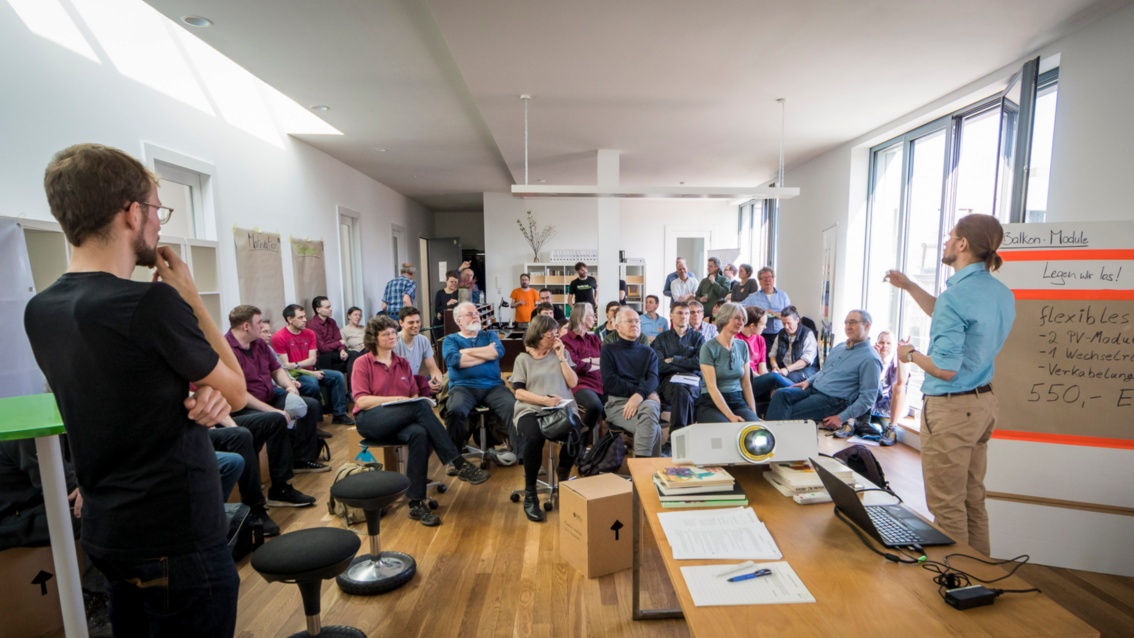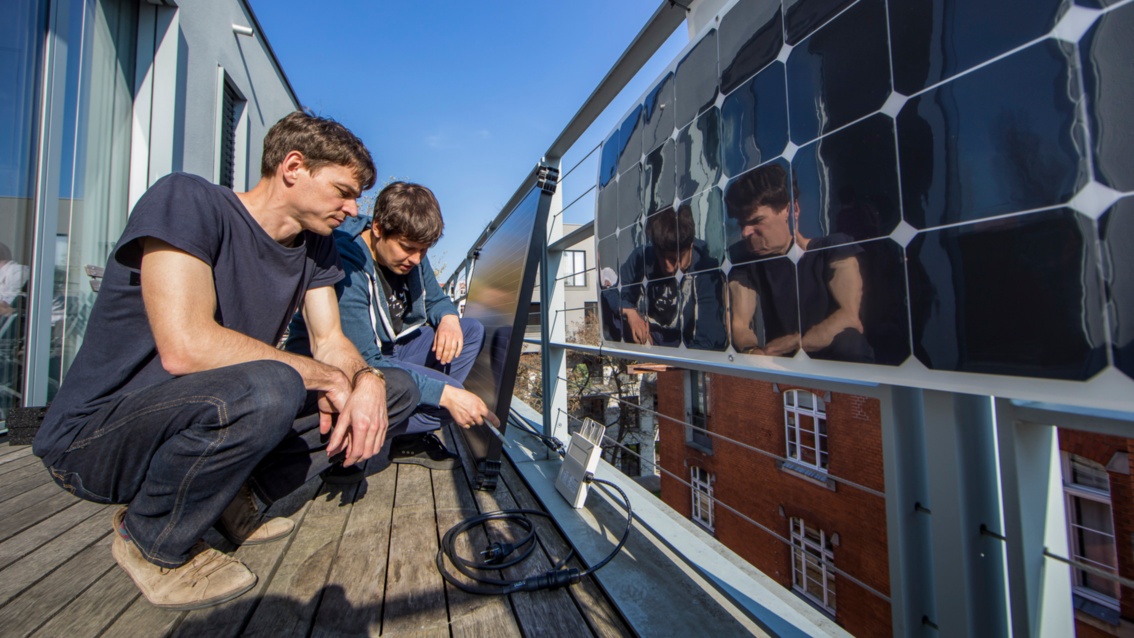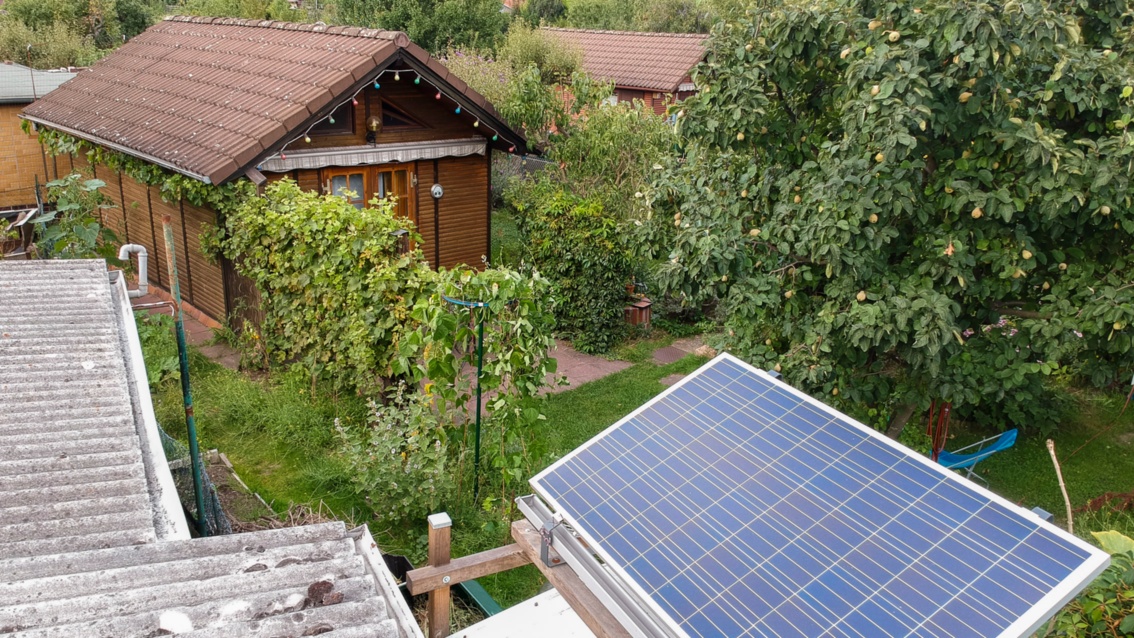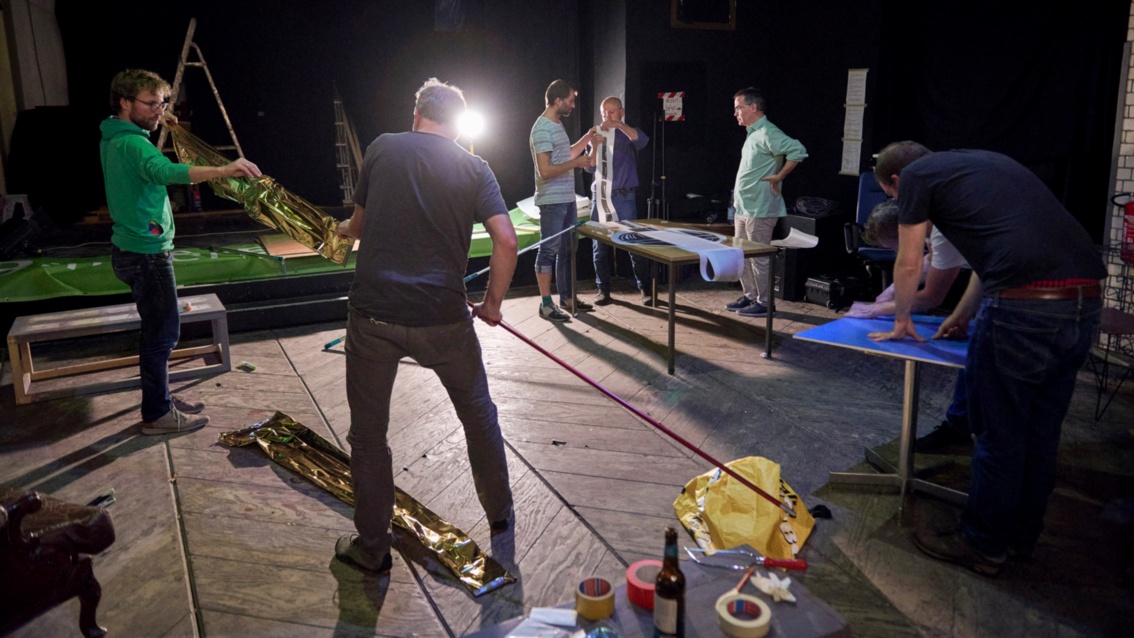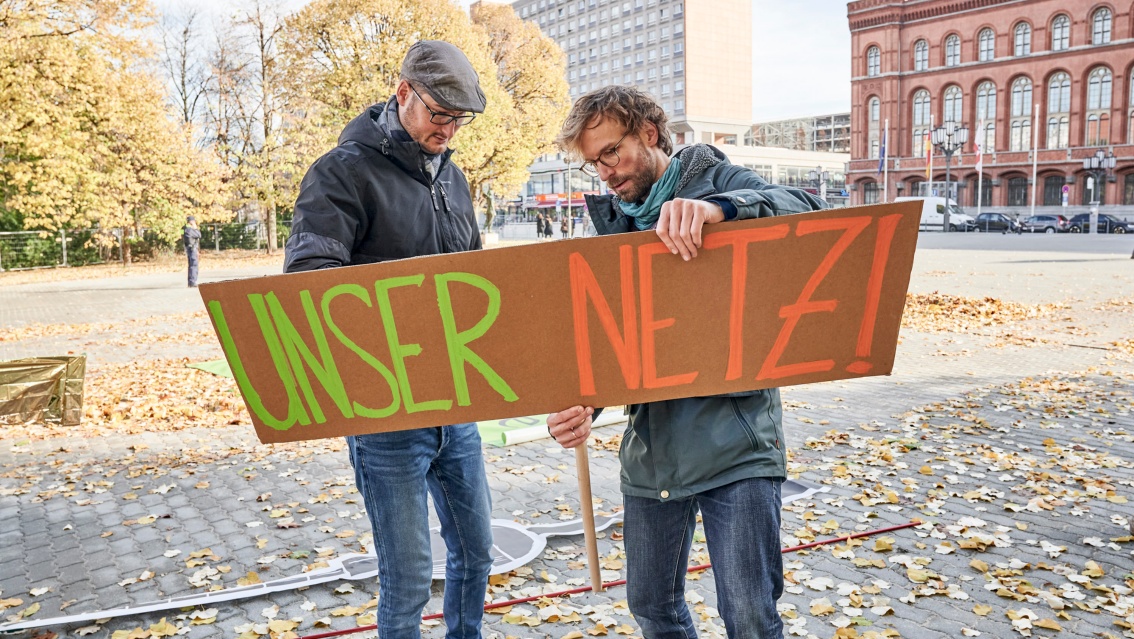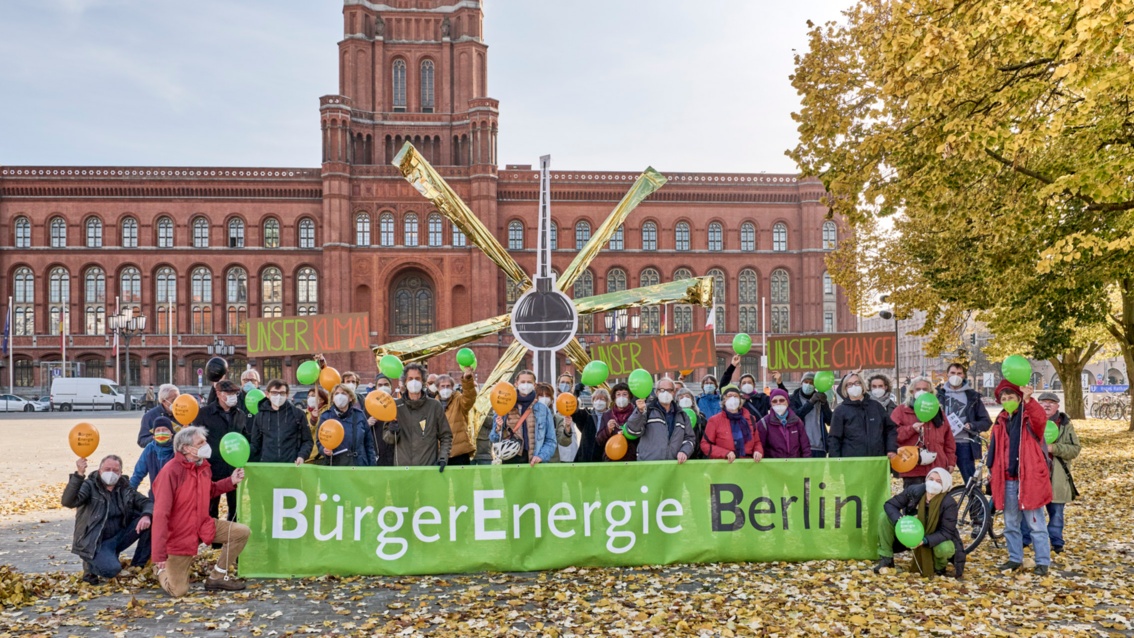A beacon for Berlin
A report by Petra Völzing
BürgerEnergie Berlin has been fighting for climate protection and the participation of citizens in the city's energy networks for over a decade.
It was an October evening during the coalition negotiations for Berlin’s new state government, and members of the energy cooperative BürgerEnergie Berlin (BEB) had gathered in the city’s Moabit neighbourhood. In Kulturfabrik, a former factory turned cultural hub, they poured over technical drawings and freshly painted banners. This was the scene as the cooperative prepared for a demonstration in front of Berlin’s town hall, the Rotes Rathaus, to drum up support for its core demand: citizen participation in Berlin’s energy grids. “We want the Berlin state government to join forces with us to realise that goal,” says BEB board member Christoph Rinke, explaining the reason the cooperative gathered in front of the Rotes Rathaus back in the autumn of 2021. “Citizen participation in Germany’s largest electricity and heating grid would have a huge impact,” stresses Rinke. “It would make Berlin a shining example of citizens actively joining forces with politicians to shape the future of their cities.”
Taking on a major fossil-fuel player
BEB was founded with the goal of achieving co-ownership of Berlin’s electricity grid, thus giving citizens active participation in and direct influence on the city’s infrastructure. At the time, that was a particularly bold move, as it meant going up against Berlin’s grid operator, the multinational energy company Vattenfall. To date, the young citizens’ cooperative has managed to raise a remarkable twelve million euros from a wide range of people, all eager to demonstrate their willingness to get involved – even without any guarantee of participation from the senate.
Founded in December 2011, the cooperative entered Berlin’s 2012 tender for concession of its electricity grid for the next 20 years. BEB’s goal at that time was to drive out Vattenfall and partner up with the state of Berlin as joint grid operators. Seven years later, it had advanced to the final three in the bidding process. Ultimately, the contract was awarded solely to the state of Berlin – but BEB has persevered with its goal, tirelessly campaigning for state-owned grid operation with civic input through a citizens’ cooperative. “Time and again, the positive response and encouragement we have received from so many people is what has kept us going on this long journey,” says Christoph Rinke. “It has confirmed our belief that cooperative participation can indeed become a reality.”
A Herculean task for Berlin
In mid-2021, the state of Berlin bought back its energy grid. That represented an important first step for BEB – all the more so because the state government has a grand vision: to achieve climate neutrality by 2045. The ambitious Solarcity Master Plan is particularly important in pursuit of that goal. It aims to bring about a massive increase in Berlin’s solar energy consumption – from the current three percent to 25 percent by 2045. For that goal to become a reality, starting today the city will need to install as much photovoltaic capacity each year as has been installed over the past 25 years in total.
The power grid plays a crucial role in this rapid expansion plan, as each individual system must be technically integrated into the grid. It’s fair to say, therefore, that the state of Berlin has a Herculean task ahead of it. According to an analysis by the Berlin University of Applied Sciences (HTW), one third of the newly created capacity will have to be installed on the roofs of privately owned residential buildings. That means involving real estate companies, property managers and individual owners in the installation of around 150,000 small PV systems.
“We urgently need citizens to become part of this solar boom – at an institutional level,” Rinke emphasises. Moving forward, grid operators and citizens will have to cooperate as partners: citizens with PV systems will require easy access to the grid with minimal bureaucracy, and the electricity grid operator must learn to understand the needs of participating citizens in order to ensure fast and efficient progress. Up to now, the task of an electricity grid operator has been to simply distribute energy from a few large plants to consumers. “From now on, however, the need for dialogue will increase tremendously, as there are a lot of new players coming onto the field,” says Rinke. “We bring in the citizens’ perspective – along with our own expertise from the numerous projects we’ve been part of and implemented.”
Bringing ideas to the people
BEB’s commitment to fighting for greater citizen participation, climate protection and solar power has been well received in Berlin. Matthias Hinnecke is a volunteer for the cooperative. He recruits supporters at BEB information stands, where he has experienced this positive response first hand: “People from all different walks of life approach me, wanting to get involved,” he says, explaining that many laypeople have their own personal experiences of how difficult it is to generate their own energy. Hinnecke is a freelance consultant for photovoltaics and energy efficiency and has been with BEB practically since day one. His passion for the idea of citizen-owned energy was ignited when he heard about how the so-called “Schönau electricity rebels” successfully took over their local power grid via their green electricity cooperative Elektrizitätswerke Schönau (EWS). BEB is now a long-standing partner of EWS, selling its energy to consumers and receiving support for its own work in return.
Hinnecke likes to share his knowledge and experience with those who stop by the information stands. “I particularly enjoy getting into in-depth conversations, even though they can be quite time-consuming,” he says as he loads his information material back into the box of his cargo bike. “People have such varied questions on the topic, and I like sharing helpful information and tips.” It is a Saturday, and Hinnecke has just spent six hours staffing the BEB information stand at a summer festival in Berlin’s Biesdorf district – just one of many afternoons and evenings he dedicates to the cause. “It can be exhausting sometimes,” he admits. “But it’s worth the effort. Even if we don’t always recruit new members on the spot, we’re still getting our ideas out to the people.”
Positive responses to wide-ranging activities
And BEB is certainly not struggling to find members: today, at least 3,000 people are contributing financially for a stake in the electricity grid via BEB. The cooperative’s active participation in political discourse has no doubt helped raise its profile. In the lead-up to Berlin’s parliamentary elections, for example, BEB organised various energy policy events. One that drew a lot of attention was a panel discussion where the leading political candidates debated future climate, and energy policies and the core role of the energy grid. “Achieving a climate-neutral Berlin will take more than just adding a bunch of solar panels,” says Christoph Rinke. “Climate neutrality requires a profound transformation of society – and we want to support that transformation.”
WE WANT TO DEVELOP IDEAS THAT ARE FIT FOR A SUSTAINABLE CITY AND GIVE PEOPLE THE SPACE THEY NEED TO ACTIVELY PARTICIPATE.
BEB is providing support at various levels. In addition to political initiatives and campaigns, it also participates in cultural and public awareness events that look at the impact of climate change on society – like Berlin’s Long Night of the Climate, for example. The cooperative even runs its own solar energy projects. “We are interested in anything and everything to do with the community and social innovations – be it on a technical, political, or emotional level,” explains Rinke. “We want to develop ideas that are fit for a sustainable city, breathe life into those ideas, and give a wide range of people the space they need to actively participate.”
This approach is also reflected in the broad range of perspectives within BEB itself, whose members include students and retirees, experts in technology and energy, socio-political activists, high earners, and low earners – even a former German economics minister. The volunteers that make up the organisational team, which is responsible for events, overseeing projects and coming up with new ideas, are just as diverse in their interests and skillsets. As a result, the focus of the cooperative is not solely on solar technology and the electricity grid concession, but includes topics as wide-ranging as social justice and digitalisation.
I WANT TO MAKE A DIFFERENCE AND I KNOW I CAN ALWAYS COUNT ON MY TEAM’S SUPPORT – IT'S A GOOD FEELING.
Organisational team member Kirsten Heininger likes this open approach. She works in environmental education and has been an active member of BEB since 2014. “I really care about the political and social aspects of Germany’s energy transition,” she explains. One of her main passions is gender equality: “We at BEB want to reach as many people as possible, which means we also need to promote gender equality,” she says. “That’s why we make sure, for example, that there is a balance of female and male speakers at events and that we use gender-appropriate language.” Heininger is clearly proud of her team: “Everyone contributes in a different way,” she says. “I want to make a difference in this area, and I know I can always count on my team’s support – it’s a good feeling.”
A resonating choir practice
The ambitious idea of cooperative participation in Berlin’s electricity grid was born in the summer of 2011 as the brainchild of Luise Neumann-Cosel and Arwen Colell. “Luise and I came up with the idea together after a choir rehearsal,” recalls Colell. The two friends wanted to prevent Berlin’s electricity grid concession from being awarded to big coal and nuclear companies like Vattenfall, Eon, or the State Grid Corporation of China. They believed that decisions regarding the city’s energy should instead be driven by climate protection, the Energiewende (Germany’s term for its energy transition), and citizen participation. Neumann-Cosel and Colell quickly won over many people with their brave idea and laid the foundation stone for what is now Berlin’s largest energy cooperative. Both women are still active at BEB today, where they continue to develop the cooperative as members of the supervisory board.
“The rapid increase in membership proved to us that a grid takeover is not just about the technical infrastructure,” says Colell. “Energy grids are also a public service, so this is very much a societal issue that must include the community’s input and support.” Colell is a political scientist who completed her doctorate on the potential of a citizen-led energy transition. She was appointed to the supervisory board of the now state-owned energy company Stromnetz Berlin in 2021 – a positive signal for the future of cooperative participation.
She considers civic energy to be an essential driving force behind the decentralisation of Germany’s Energiewende: “The energy transition affects our everyday lives in many ways,” says Colell. “It’s far more than a technological revolution or a purely political process – it represents a change in society as a whole.” She goes on to add: “Citizen cooperatives are the best way forward in the Energiewende, as they provide an authoritative body to voice the community’s views on key aspects of public services.”
Boosting participation and projects
That is why BEB regularly comes up with a wide variety of new ideas to gain even more participatory support. Recently, for example, the team discovered the potential of allotment gardens: “There are a lot of allotments in Berlin and most of them are connected to the grid,” says Christoph Rinke. “But it would be great if those 60,000 green-fingered gardeners could also be harvesting power with their own little PV systems.”
Those who don’t have their own roof space can also participate in the citizen-led Energiewende thanks to BEB’s tenant electricity projects. The cooperative also promotes balcony modules as a particularly low-threshold way for people living in flats to produce and consume their own solar power. For homeowners, BEB is looking into how the idea of a solar DIY cooperative – which has been successful so far in Switzerland – could be transferred and adapted to the conditions in Berlin. In a pilot project, BEB members are helping each other install PV systems on their roofs to save costs, share know-how, and, of course, because they enjoy spending time together.
Meanwhile, back in Moabit, Rinke is sitting with Kulturfabrik board member Stefan Fürstenau at the bar of local pub and venue Laika, looking back on the success of the latest Long Night of the Climate. The most recent edition was held in 2023 under the motto “Know, Feel, Act” and featured a jam-packed programme of more than 50 events, including film screenings, musical performances, workshops, and keynote speeches on the challenges and consequences of climate change.
Fürstenau considers the Long Night of the Climate a great success: “Over 1,000 people came together to get involved in projects, discuss ideas, and have a good time. The programme made it very clear to participants that we can’t just have ‘business as usual’ and that everyone can take action to change the world for the better.” This is also the philosophy that motivates Rinke in his work as a BEB board member: “Many cooperatives are demonstrating the way that society needs to develop in order to protect our planet from further damage. Their work and passion is not driven by the ideas of growth and profit maximisation, but by the wellbeing of people and the environment.”
CITIZENS ARE NOT ONLY READY FOR A CHANGE – THEY ARE WILLING TO PUT THEIR HEART AND SOUL INTO IT.
The late-October weather for BEB’s demonstration at the Rotes Rathaus was glorious, with blue skies and sunshine. Sunbeams carefully crafted from recycled foil were unfurled and positioned to make them “radiate” out of a miniature cut-out of the TV Tower. Behind the green BürgerEnergie Berlin banner, campaigners held up cardboard signs as they chanted: “Our climate! Our grid! Our chance!” The sentiments that were expressed at the time of the coalition negotiations are more relevant today than ever: three years after purchasing the electricity grid, the state of Berlin is now in the process of also buying back the district heating grid from energy giant Vattenfall. “We have put down on digital paper all of the pertinent issues,” says Matthias Hinnecke. “And that is further proof that Berlin’s citizens are not only ready for a change – they are willing to put their heart and soul into it.”
BEB’s demonstration in front of the town hall three years ago secured the cooperative’s goals a place in the resulting coalition agreement. Unfortunately, however, that success was short-lived due to the repeat election in 2023 and the new senate led by Kai Wegner. In future, the state will operate both the electricity and district heating networks. That requires not only an integrative view of the technology involved in the regenerative production of power and heat, but also – and most importantly – far greater involvement of citizens.
“Once again, this is a huge opportunity for Berlin,” says Arwen Colell, “We have the chance to set up a modern public company that operates in close coordination with the citizens. The door is wide open – now we really need everyone to get involved and help shape a climate-neutral future.” So, what’s the next step? “Now it’s up to the Berlin senate to reach out and take our hand,” smiles Christoph Rinke. “Then we can set off on the most important leg of our journey so far!”
Translated from the German by Grace Winter / Babelfisch Translations. You can also read the report in German. / Lead photo: Saskia Uppenkamp
+ This text was updated in 2024 +
Related stories
-

Solidarity through sunlight
Cooperative solar panels on the roofs of social facilities in Portugal show how citizens’ energy initiatives promote solidarity and community spirit.
-
